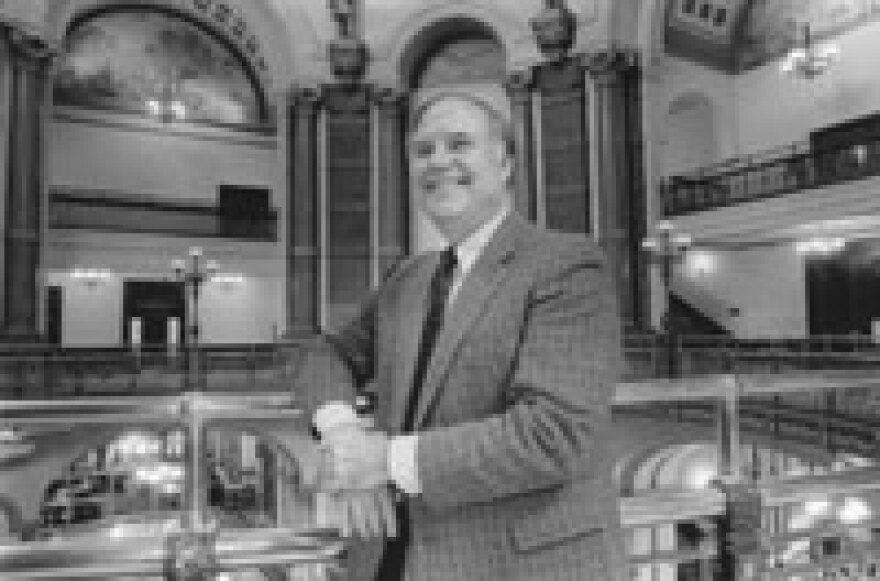Like a high-rolling homeowner pawning the family silver to prop up an extravagant lifestyle, Gov. Rod Blagojevich wants to sell or lease the state lottery to bring in a quick $10 billion or so for education.
State Sen. Jeffrey Schoenberg, meanwhile, is pushing privatization of the state's 274-mile toll road network to garner upwards of $15 billion for transportation projects and pension funding.
Both plans hold out an almost irresistible lure for politicians in an election year — a promise of lots of cash in a hurry, virtually pain-free in the short term.
The governor's lottery proposal calls for pumping an additional $6 billion into education funding over the next four years, two-thirds of it from proceeds of the lottery deal. The other $6 billion would be invested to generate $650 million a year for schools through fiscal year 2025. The new funding would be targeted to a host of worthwhile causes, such as programs helping failing students and schools, expanded preschool slots and smaller class sizes, special education needs, and new classrooms and textbooks.
Schoenberg, an Evanston Democrat, argues that selling or leasing the tollway would provide a windfall for new roads, bridges and mass transit, as well as reduce the state's near $40 billion unfunded pension liability.
Neither plan, though, is without the potential for dire long-term consequences for Illinois citizens, a point recognized most notably by House Speaker Michael Madigan. Returning to the fiscal prudence he abandoned last year — when he agreed to underfund pensions by $2.3 billion — the speaker now is asking pointed questions he says need to be answered before either proposal moves ahead.
Neither plan, though, is without the potential for dire long-term consequences for Illinois citizens, a point recognized most notably by House Speaker Michael Madigan.
Madigan's concerns, presumably shared by other thoughtful Illinoisans, emerged in letters he sent to Blagojevich and to Schoenberg and Hoffman Estates Republican Rep. Terry Parke, the chairs of the Commission on Government Forecasting and Accountability. The panel has hired an investment adviser, Credit Suisse, to analyze the potential value of a tollway lease.
Perhaps the most glaring shortcoming in the governor's lottery scheme is its built-in drop-off in school funding after the initial windfall is exhausted in four years. Coming up with $2 billion or so to continue the beefed-up programs in Year Five would require lawmakers to hike taxes, cut other spending, find another asset to peddle or dream up an even wilder scam.
"We must consider our obligations not only to those who need help today, but also that we keep the state on a sound financial footing so that we can meet our responsibility to those who will need help tomorrow," Madigan told Blagojevich.
Besides the five-year vanishing act, the governor's proposal fails to address the major cause of the notorious inequities in school funding in Illinois — the state's heavy reliance on local property taxes. And downstate legislators worry that "failing students and schools" may be code for Chicago, with their districts seeing little new money. Such fears were heightened because the lottery proposal surfaced just in time to convince state Sen. James Meeks, a Chicago Independent and chair of the Legislative Black Caucus, to drop a third-party bid for governor that could have torpedoed Blagojevich.
Besides funding questions, the lottery plan raises other issues. It's a safe bet that whoever pays $10 billion for rights to the lottery will seek to maximize profits on the deal. Could that mean more sales agents, stepped-up advertising in low-income communities, online games, keno parlors? If legislators block such aggressive marketing tactics, will someone really pony up $10 billion?
Similar uncertainty surrounds the tollway proposal. For suburban drivers, who account for the most traffic on the system, the biggest question is how soon and how high a private operator will raise tolls. Indeed, Schoenberg wants
to set aside some of the lease proceeds to offset future toll hikes for regular users.
But higher tolls are not the only issue. Another way to improve the bottom line would be to cut costs — which could mean lower wages and fewer benefits for employees of a private operator than are now paid to unionized tollway workers — or reduced repair and maintenance outlays.
Suburban lawmakers argue that any windfall from leasing a network built largely through decades of tolls paid by their constituents should be used to ease traffic congestion and improve mass transit in their region. But a bidder for the tollway lease might seek a "no-compete" clause, prohibiting any new or improved roads that might offer drivers alternate routes to the privatized system.
The legislature can dictate the terms of a lease. For example, it could require the operator to follow state purchasing rules and to pay union wages or to hold off on toll increases. The more restrictions imposed on the lease, however, the less lucrative the deal is likely to be for the state.
"Any attempt to assign a value must be preceded by a serious analysis of the conditions that will attach to the lease," Madigan wrote in posing 17 "fundamental" questions for Credit Suisse to address.
While Madigan has been noncommittal on the plans, the Center for Tax and Budget Accountability, a bipartisan research and advocacy think tank, minces no words.
"If in fact the targeted education programs represent wise and needed investments, then why sell a state asset today and create the need to raise taxes tomorrow," wrote center analysts in a briefing paper. "If the investment is needed today, Illinois should take the fiscally responsible strategy of raising the tax revenue necessary to fund these programs today."
While aimed at the lottery deal, the broader point is well-taken: Cashing in one's assets to live beyond one's means is a recipe for financial disaster.
Charles N. Wheeler III is director of the Public Affairs Reporting program at the University of Illinois at Springfield.
Illinois Issues, July/August 2006






